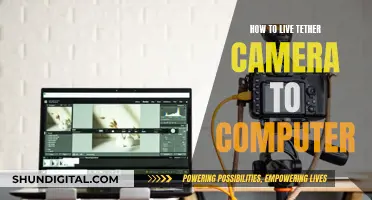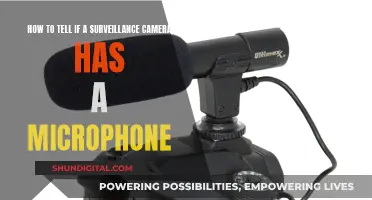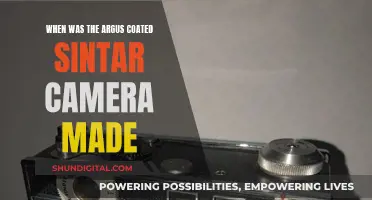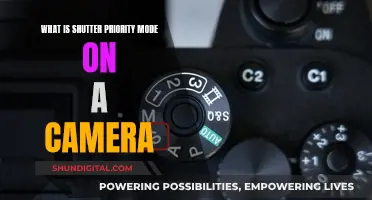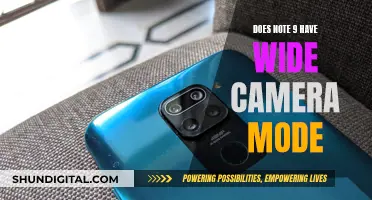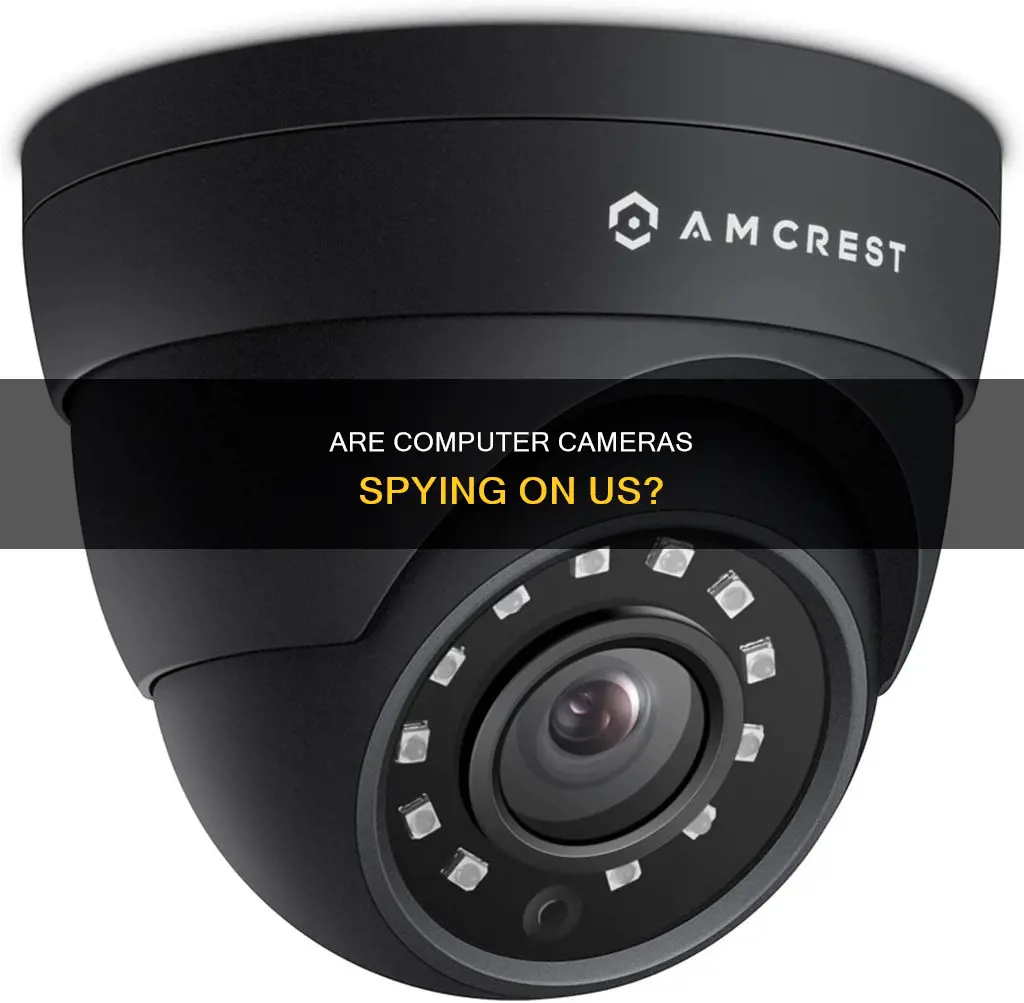
In today's tech-driven world, privacy is a growing concern. With the rise of video chatting and social media live streaming, our computer cameras are more vulnerable than ever to potential hackers. Unsecured cameras on computers and other devices can provide malicious actors with a direct window into our lives, leading to serious privacy breaches and even blackmail attempts. While it may seem paranoid, there is a possibility that someone could be watching you through your computer camera without your knowledge. This topic will explore the risks, signs, and ways to protect yourself from webcam hacking.
| Characteristics | Values |
|---|---|
| Can computer cameras watch people? | Yes |
| How easy is it for hackers to take over a camera? | It is surprisingly easy for hackers to take over a camera. In some cases, the malware could be installed before a user buys their computer. |
| How can someone tell if their camera has been hacked? | One of the most obvious indications is the activation of the indicator light, even when the camera is not in use. However, this signal can be disabled by an attacker. More technical indicators include the transmission of audio or video traffic from the device, the presence of running webcam processes and services, audio and video storage files and logs. |
| How can someone protect themselves from being watched? | Covering cameras when not in use is a recommended way to protect oneself. People can use plasters or buy small webcam covers that can slide open and shut. |
What You'll Learn

Computer camera hacking is a lucrative business for criminals
The potential impact of this type of hacking can be severe. For example, hackers can use footage obtained from webcam hacking for blackmail and identity theft. They can also use it to spy on people in their most intimate moments, compromising their privacy. In some cases, hackers have been known to demand money from victims in exchange for not releasing embarrassing photos or videos obtained through webcam hacking.
Webcam hacking can also have serious consequences for organizations. By hijacking webcam feeds, hackers can eavesdrop on sensitive meetings, exposing organizations to the risk of corporate espionage, insider trading, and theft of confidential information.
The rise of video conferencing during the COVID-19 pandemic has made webcam hacking even more attractive to criminals. With millions of people working from home, the opportunity for hackers to access sensitive information and compromise security has increased exponentially.
To make matters worse, it is not always easy to detect when a webcam has been hacked. However, there are some warning signs that individuals and organizations can look out for, such as unusual file appearances, abnormal behavior of the indicator light, and background apps consuming excessive data.
To protect against webcam hacking, it is important to follow best practices such as using strong and unique passwords, updating operating systems and antivirus software, avoiding suspicious links and public Wi-Fi, and covering webcams when not in use. By taking these precautions, individuals and organizations can minimize the risk of falling victim to this lucrative criminal business.
The Keystone K7 Camera: A Rare Vintage Find
You may want to see also

The FBI has also hacked into people's computer cameras
In our tech-driven world, privacy can easily be compromised. If hackers can penetrate the White House, they can likely crack our personal devices. In 2014, the FBI ran its largest cyber operation to date, arresting webcam hackers in more than 12 countries. The programme, called Blackshades, gave users access to photographs and other files on the victim's computer, including the ability to activate the victim's webcam to spy on them.
There is evidence to suggest that the FBI has also hacked into people's computers to access their webcams for surveillance. In 2013, Marcus Thomas, former assistant director of the FBI's Operational Technology Division in Quantico, stated that the FBI had been able to covertly activate a computer's camera without triggering the recording light for several years. This raises concerns about the potential invasion of privacy by government agencies.
Many internet-connected webcams have their own IP address, allowing remote access from anywhere in the world. However, if the camera is not protected by a strong password, it becomes vulnerable to hackers. Computer-connected webcams can also be accessed by hackers using malware, which can be installed by tricking users into clicking a bad link or downloading a malicious file.
To protect themselves from potential webcam hacking, individuals are advised to cover their computer cameras when not in use. Additionally, it is important to have up-to-date webcam software and anti-virus or firewall protection to reduce the risk of camfecting, where a hacker gains access to a webcam without permission.
Speeding Tickets by Camera: Impact on Georgia Insurance Rates
You may want to see also

Covering your camera is a simple way to protect yourself
In today's tech-driven world, our privacy can be easily compromised. If hackers can penetrate the White House, they can likely crack our personal devices. Modern devices capable of connecting to the internet often have cameras that can be accessed by hackers. This can be done through the use of malware, which is often accidentally downloaded by the user. In 2014, the FBI ran its largest cyber operation to date, arresting scores of webcam hackers in more than 12 countries. These hackers used a program called Blackshades to access victims' webcams and spy on them.
The threat of webcam hacking is real, and it can have dire repercussions. Criminals have been known to record video footage and extort money from their victims. In some cases, hackers have even demanded money in exchange for not releasing embarrassing or intimate photos and videos. Webcam hacking can also be used to gain access to sensitive information, such as passwords and browsing history.
One of the best ways to protect yourself from webcam hacking is to cover your camera when it's not in use. This is a simple and inexpensive solution that can give you peace of mind. Here are some ways to cover your webcam:
- Use invisible tape for a quick and discreet cover.
- Try washi tape for a stylish and easily removable option.
- Place a cute sticker over the camera for a fun and protective layer.
- Install a sliding webcam cover that can be adjusted to block the camera when not in use.
- Use a square webcam cover that can be easily removed when needed.
- Disable your webcam manually through your device settings.
While covering your webcam is a great first step, it's important to also cultivate a security mindset. This includes keeping applications up to date, using strong passwords, following email security best practices, and being wary of links and downloads. Additionally, installing anti-virus software and keeping your devices updated can provide extra layers of protection.
By taking these simple steps, you can help secure your privacy and protect yourself from potential webcam hacking.
Charging Camera Batteries: Using the Right Charger
You may want to see also

Signs that your computer camera has been hacked
The idea of someone hacking your laptop camera and spying on you is not just a plot device in Hollywood films. It is a real threat, and it is not very difficult for hackers to take control of your webcam. This is called "camfecting", and it is one of the most common types of hack.
- The camera indicator light is on or blinking even though you haven't turned the webcam on. However, do note that the indicator light is not always reliable as it can be overridden.
- Your browser extensions are turning on your webcam.
- There are unexpected webcam video or audio files stored on your computer.
- Your security settings have been changed.
- Your virus scan reveals suspicious apps or malware.
- You get a message from a hacker, often trying to extort money from you.
- Your network traffic is high even when you are not using any apps or browser windows.
- You see suspicious movement from an external webcam.
Fujifilm Camera: Converting RAW to JPEG Simplified
You may want to see also

How to avoid having your computer camera hacked
Having your computer camera hacked is an invasion of privacy and a terrifying prospect for many. It is not as impossible as you may think. Here are some tips to avoid this:
Use a reliable antivirus
Choose an antivirus with advanced protection against malware, spyware, and viruses. An antivirus program will take care of detecting and removing malicious threats before they do any harm.
Don't fall for phishing
Hackers may disguise themselves as support agents and contact you saying there is an issue with your system. They may ask you to download remote-access software, which then allows them to access your camera and manage its permissions. Treat emails from unknown senders with caution and do not click on suspicious links or download attachments.
Stay secure on public Wi-Fi
Public Wi-Fi networks are extremely vulnerable to hacking. Always use a VPN to secure your connection and protect yourself from unwanted intruders.
Cover your webcam
This is the easiest and most reliable way to prevent someone from watching you through your computer camera. Tape it, or use a webcam cover that can be slid open or closed.
Be cautious of messages from hackers
If you receive a message from a hacker trying to extort money from you, do not fall for it. They will often try to get payment through an obscure bitcoin wallet or a similar untraceable method. Almost all of these messages contain lies, and they are often a vehicle to install ransomware on your computer. Treat them like any other phishing attempt.
Check for warning signs
Keep an eye out for warning signs that your camera may have been hacked. These include the camera indicator light turning on at strange times, unexpected webcam video files stored on your computer, and changes to your security settings.
Smart Focus: How Cameras Autofocus with Precision
You may want to see also
Frequently asked questions
Yes, it is possible for someone to watch you through your computer camera. In 2014, the FBI ran an operation that arrested scores of webcam hackers in more than 12 countries.
Hackers can use malware to access your camera. This can happen when you accidentally click on a bad link or download a sinister file.
One way to know if someone is watching you is if the indicator light on your webcam is blinking abnormally or is on without your consent.


